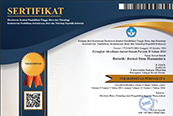Reversal: The Colonial Afterlife and Nostalgia
(1) Amsterdam School for Cultural Analysis, University of Amsterdam
(*) Corresponding Author
Abstract
This experimental essay unfolds as a journey through memory, ruins, and rituals, tracing the lingering presence of a colonial past in contemporary Indonesia. It explores the layered relationship between colonialism, postcolonial nation-building, and the enduring structures of imperial power that continue to shape cultural and political life. At its centre is a paradox: in pursuing national unity, the newly independent state often reproduced the very systems of control it aimed to dismantle. Colonial nostalgia, expressed through aesthetic revivals, architectural restoration, and performative rituals, emerges not only as a sentiment but as a structural force within collective memory. Through a weaving of critical reflection and poetic interludes, the essay invites readers to reflect on the shifting boundary between history and feeling. It lingers in what is remembered but also in what is imagined, suppressed, and restaged.
Keywords
Full Text:
PDFReferences
Anderson, Benedict. Java in a Time of Revolution: Occupation and Resistance, 1944–1946. Ithaca: Cornell University Press, 1972.
Benedicto, Bobby. ‘The Place of the Dead, the Time of Dictatorship: Nostalgia, Sovereignty, and the Corpse of Ferdinand Marcos’. Environment and Planning D 39, no. 4 (2021): 722–39. https://doi.org/10.1177/02637758211013038.
Boym, Svetlana. The Future of Nostalgia. New York: Basic Books, 2008.
Gandhi, Leela. Postcolonial Theory: A Critical Introduction. Sydney: Allen & Unwin, 2019.
Heryanto, Ariel, and Vedi R. Hadiz. ‘Post-Authoritarian Indonesia: A Comparative Southeast Asian Perspective’. Critical Asian Studies 37, no. 2 (2005): 251–75. https://doi.org/10.1080/14672710500106341.
Hill, David T. The Press in New Order Indonesia. Nedlands: University of Western Australia Press in association with Asia Research Centre on Social Political and Economic Change, Murdoch University, 1994.
Kristeva, Julia. Desire in Language: A Semiotic Approach to Literature and Art. Edited by Leon Roudiez. Translated by Thomas Gora and Alice Jardine. New York: Columbia University Press, 1980.
Kusno, Timoteus Anggawan. ‘Dismantling the Monuments: Artistic Approaches in the Making of “Luka Dan Bisa Kubawa Berlari”’. Third Text Online, 28 September 2024. http://www.thirdtext.org/kusno-dismantlingmonuments.
———. ‘History as a Battleground: The Centre for Tanah Runcuk Studies as a Method of Artistic Intervention’. Inter-Asia Cultural Studies, 2025, Advance online publication. https://doi.org/10.1080/14649373.2025.2489887.
Lorcin, Patricia M. E. ‘Imperial Nostalgia; Colonial Nostalgia’, 1 December 2013. https://doi.org/10.3167/hrrh.2013.390308.
Mignolo, Walter D. ‘Delinking: The Rhetoric of Modernity, the Logic of Coloniality and the Grammar of de-Coloniality’. Cultural Studies 21, no. 2–3 (2007): 449–514. https://doi.org/10.1080/09502380601162647.
———. ‘Introduction: Coloniality of Power and de-Colonial Thinking’. Cultural Studies 21, no. 2–3 (2007): 155–67. https://doi.org/10.1080/095023806.
Nordholt, Henk Schulte. De-Colonising Indonesian Historiography. Focus Asia 6. Lund: Centre for East and South-East Asian Studies, Lund University, 2004.
Ong, Hok Ham. Dari soal priyayi sampai Nyi Blorong: refleksi historis nusantara. Jakarta: Penerbit Buku Kompas, 2002.
Quijano, Aníbal. ‘Coloniality of Power and Eurocentrism in Latin America’. International Sociology 15, no. 2 (2000): 215–32. https://doi.org/10.1177/0268580900015002005.
Robinson, Geoffrey B. The Killing Season: A History of the Indonesian Massacres, 1965-66. Princeton: Princeton University Press, 2018.
Robison, Richard. Soeharto & Bangkitnya Kapitalisme Indonesia. Depok: Komunitas Bambu, 2012.
Routledge, Clay, Tim Wildschut, Constantine Sedikides, and Jacob Juhl. ‘Nostalgia as a Resource for Psychological Health and Well-Being’. Social and Personality Psychology Compass 7, no. 11 (2013): 808–18. https://doi.org/10.1111/spc3.12070.
Stoler, Ann Laura. ‘Imperial Debris: Reflections on Ruins and Ruination’. Cultural Anthropology 23, no. 2 (2008): 191–219. https://doi.org/10.1111/j.1548-1360.2008.00007.x.
Sudibyo, Agus, and Nezar and Patria. ‘The Television Industry in Post- Authoritarian Indonesia’. Journal of Contemporary Asia 43, no. 2 (1 May 2013): 257–75. https://doi.org/10.1080/00472336.2012.757434.
Terada, Rei. Feeling in Theory: Emotion after the ‘Death of the Subject’. Cambridge, MA: Harvard University Press, 2009.
DOI: https://doi.org/10.24071/ret.v13i1.12062
Refbacks
- There are currently no refbacks.
Copyright (c) 2025 Timoteus Anggawan Kusno

This work is licensed under a Creative Commons Attribution 4.0 International License.
Retorik: Jurnal Ilmu Humaniora is published by the Graduate Program in Cultural Studies at Sanata Dharma University, Yogyakarta, Indonesia.
Retorik is also available in print edition. Please click here for contact information.










